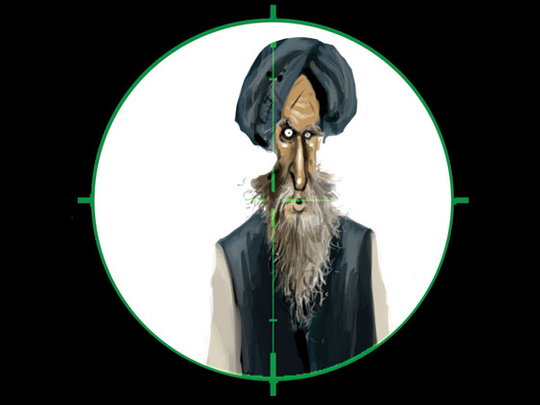
The disclosure made by US Defence Secretary Leon Panetta about Pakistan starting a new offensive in an undisclosed agency of the Federally Administered Tribal Areas (FATA) is likely to trigger heated debate in Islamabad about the feasibility of starting a military operation at this stage. It comes at a time when the crumbling edifice of ‘critical ties with Washington’ has barely been put together again.
Panetta may have been quick to point out that the new offensive will not be targeting the Haqqani network, ratherindigenous Pakistani insurgents in the area, but his attempt at subtlety has clearly not been successful.
The unnamed agency is none other than North Waziristan, where Afghan insurgent groups controlled by Jalauddin Haqqani and his son Sirajuddin have allegedly taken refuge to regroup and launch attacks against the International Security Assistance Forces (ISAF).
This news, coupled with Pakistan Army Chief General Ashraf Pervez Kiyani’s Independence Day message to the nation of the need for critical popular support for the success of any military operation against extremists does portend a hectic schedule in the coming months for military planners.
But is Pakistan in a position to bear the brunt of popular outrage that is likely to boil over if any operation is perceived as being undertaken due to US pressure? The furore over last year’s killing of 26 Pakistani soldiers by Nato forces at the Salalah border checkpost has hardly died down, and anger is mounting over every fresh US drone strike.
More importantly, would the government risk a possible wave of reprisal attacks elsewhere in the country in the present circumstances? With public tolerance having reached breaking point in the face of extreme power shortages, soaring inflation, unemployment and increasing lawlessness, and with elections around the corner, it may not be an ideal time to risk the wrath of the street.
Pakistan’s decision to finally launch an attack in its tribal belt which undoubtedly will be on the same scale as the ones launched some years back in South Waziristan and Mohmand, would not have been an easy one. Relations between the Pakistani military and the US and EU have been far from ideal.
The break in military cooperation following last year’s Nato attack probably did more damage than the accumulated mistrust and the continuous drone strikes over the past many years. An official US apology months after the incident and hectic diplomatic efforts to restrain the often vitriolic blame game aimed at the military and intelligence services has finally led to resumption of talks, and now the North Waziristan operation, long sought by Washington.
A collective effort to destroy a very strategic bastion of a key Afghan insurgent group, whose presence and efforts to aid the Taliban is considered critical to the war effort, is also likely to influence future Pakistan-US counter-terrorism cooperation.
Pakistan’s earlier call to Afghanistan to seal the border at the time it starts a new border military operation was merely paving the ground to the start of an operation that is likely to have full Nato and US support across the border in terms of monitoring and stationing of more forces to deter insurgents from attacking Pakistani forces.
Pakistan’s resistance to US pressure on the same subject was always interpreted as a manifestation of a dual-faced policy clearly aimed to gain leverage with key Afghan players after the US exit, in order to shape Afghanistan’s political roadmap.
Pakistan’s motives may not have been altruistic but its behaviour stems from realpolitik and the rules of engagement that have dominated regional politics has always been influenced by particular nuances of ethno-tribal affiliations and the extension of material, financial and political support to “friendly” groups.
However, a lack of alternatives to keep impending cross-border Coalition attacks at bay and indulge in further procrastination on this pivotal operation may have been the reason behind the military’s change of heart.
The question is if the intended target is even in the tribal agency anymore. While the pressure of a large scale military operation may affect the logistical chain of support the insurgents are likely to have built there, it is hardly going to help win the war.
The truth is that peace and stability in Afghanistan is not going to be won militarily and the only means of securing a political reconciliation would be to engage the enemy — at the negotiation table. Pakistan’s support to the reconciliation process is critical, a fact that has been conceded by Kabul, Washington and other Nato member states. It is therefore imperative that the overriding suspicion and acrimony eclipsing vital cooperation thus rendering it impotent, is set aside and concrete efforts are made to define a roadmap for Afghanistan’s political stability, especially with the 2014 troop withdrawal deadline drawing closer.
It may be time to redefine the goals that have remained thwarted over the years and understand that an end goal does require a change in perspective. The forced collusion of the Taliban and other groups with Al Qaida following the US attack post 9/11 may have reaped benefits for the Afghan nationalist insurgency in terms of critical strategic help in guerilla warfare but the end goals of the two have never been the same. A simple fact but one that remains obscure even as dossier after dossier piles against any chance of political reconciliation.
Meanwhile it may take more than a new military offensive to get Pakistan and the US comfortable again. Too much water has flowed under the bridge and too much blood has been spilled. Worse, the trust deficit yawns wide enough to merit concern and call upon both sides to mend fences for the sake of greater peace and stability.










